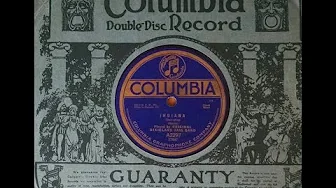Original Dixieland Jazz Band "Indiana" Columbia A2297 recorded May 31,1917 HISTORIC ODJB

Details
| Title | Original Dixieland Jazz Band "Indiana" Columbia A2297 recorded May 31,1917 HISTORIC ODJB |
| Author | Tim Gracyk |
| Duration | 3:22 |
| File Format | MP3 / MP4 |
| Original URL | https://youtube.com/watch?v=5uG2tewuw5c |
Description
Original Dixieland Jazz Band plays "Indiana" on Columbia A2297, recorded on May 31,1917.
It was issued with a small batch of other records on August 10, 1917.
The disc was announced in Columbia's September 1917 supplement, but the July 1917 issue of Talking Machine World featured an advertisement listing the record as ready for issue on August 10. Columbia was beginning the experiment of issuing some records near the middle of a month.
The advertisement states, "Here is the solution of one of your big problems--how to get more business from the 10th to the 20th--the ten dullest record days of the month!" It identifies "Indiana" as a one-step and "Darktown Strutters' Ball" as a fox-trot, as does the disc's label.
Here are the musicians: Nick LaRocca, cornet; Eddie Edwards, trombone; Larry Shields, clarinet; Henry Ragas, piano; Tony Sbarbaro, drums.
The Victor Talking Machine Company earlier recorded the Sterling Trio singing ""(Back Home Again in) Indiana" for Victor 18251 (March 22, 1917).
The performance in the Columbia studio of the same song by the ODJB about two months later influenced the course of jazz since "Indiana" would become a jazz standard, the basis for countless improvisations, even evolving two decades later into Charlie Parker's seminal "Donna Lee."
Brian Rust reports that the original recording card in the CBS files for both titles bears the date May 31, 1917. Rust had earlier made a mistake in his discographies, giving an January 1917 date for the recording session. It turns out that in late January the band made test recordings for Columbia that were never issued (they were probably destroyed at that time).
The later recording card of May 31, 1917, reveals that four takes of Shelton Brooks' "Darktown Strutters' Ball" and three of James Hanley's "Indiana" were completed, two takes of each song used for pressings of Columbia A2297.
In the Spring 1991 issue of the Association for Recorded Sound Collections Journal, Tim Brooks points out that the Columbia sides have May 1917 matrix numbers and that "notations on the original cards strongly indicate that [the Columbia sides] were recorded then as well, not renumbered from some earlier trial."
The disc was announced in Columbia's September 1917 supplement though the July 1917 issue of Talking Machine World featured an advertisement listing the record as ready for issue on August 10. Columbia was beginning the experiment of issuing some records near the middle of a month. The advertisement states, "Here is the solution of one of your big problems--how to get more business from the 10th to the 20th--the ten dullest record days of the month!" It identifies "Indiana" as a one-step and "Darktown Strutters' Ball" as a fox-trot, as does the disc's label.
A writer named Brunn reports that the band learned "Indiana" in the publisher's office immediately before the session, humming "the tune en route so that it would not be forgotten." He reports that "Darktown Strutters' Ball" was recorded in a haphazard manner: "They had rehearsed the piece in the key of 'C,' but LaRocca, at the mercy of his peculiar musical memory, started off in 'D.' His colleagues had no choice other than to follow suit..."
This is nonsense. The issued performances are polished in every way.
Recording logs establish that four takes were made of "Darktown Strutters' Ball," with the first two takes not issued. If LaRocca had played in the wrong key, the mistake was recognized and the performance not issued.
The two numbers issued by Columbia are less interesting than the two already issued by Victor (the material had been written by non-band members) but are more polished than Brunn's accounts would lead readers to believe.
Shelton Brooks was evidently grateful that the ODJB cut his "Darktown Strutters' Ball" (at Reisenweber's, the band also played Brooks' "Wakin' the Dog"). In 1918, he wrote "When You Hear That Dixieland Jazz Band Play," published by Will Rossiter. Brooks' lyrics celebrate the jazz pioneers: "At Reisenwebers' [sic] place they started, and cleaned up the whole darn town...They sway and play the 'Liv'ry Stable Blues.'"
It may seem odd that the band cut two numbers composed by others when it returned to Columbia on May 31. Given the success by late May of Victor 18255, which featured original compositions, Columbia executives were arguably shortsighted if they believed that "Indiana" and "Darktown Strutters' Ball" would appeal to record buyers more than original ODJB material. On the other hand, Columbia executives probably knew about legal disputes that followed the release of Victor 18255 and must have concluded that material composed by others was safer than original ODJB compositions.
Around the time Columbia issued what the ODJB had recorded for the company on May 31, the band had signed a contract with the Aeolian Company of New York.
Original Dixieland Jazz Band "Indiana" Columbia A2297 recorded May 31,1917 HISTORIC ODJB